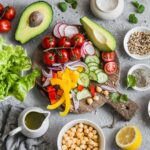Let’s All Eat Right Day is celebrated on February 25 each year, as it marks the birthday of Adelle Davis, a famous nutritionist, author, and game-changer in the nutrition movement throughout the 1900s. So we’re here to put a face to some of the integral contributions in nutrition as a field. You have probably heard it said — “Eat breakfast like a king, lunch like a prince, and dinner like a pauper” — well, this wise adage can be credited to Davis herself.
History of Let's All Eat Right Day
As important to human beings as air and water, and in some ways one might argue that food tops the list because it can affect us in ways beyond just the physical. Food can change your mood, speak to your very soul, and make a difference in your self-perception. Thus on some level, we all want to eat right and are open to making changes that may bring us to good health. So it is only fitting that there be a day to celebrate eating right, which will hopefully put us all on a lifelong path of developing a healthier relationship with our food.Nutrition itself has been around as long as humans have, however, it was not until 400 B.C. that the Greek physician Hippocrates observed the impact food has on physical health, especially when it came to the prevention and cure of illness. The ancient world foods used for medicinal properties (such as using garlic to cure stomach ailments) and the birth of nutritional science itself is fairly recent. It began with the discovery of vitamins, which were synthesized and their effects on disease studied. The name ‘vitamin’ is derived from the words ‘vital’ and ‘amine,’ coined by Dr. Casimir Funk in 1912. The onset of World War I caused widespread fear of food shortages and forced nutritional scientists to focus on food as a preventative for diseases. Hence the first Recommended Dietary Allowances (R.D.A.s) were issued around this time. Since then, nutritional science has been a burgeoning field of study, and none of us are untouched by it.While it is not known when exactly Let’s All Eat Right Day was initially celebrated, we know it falls on the birthday of Adelle Davis as a way of honoring her work and the legacy she left. With bestselling books like “Let’s Eat Right to Keep Fit” (1954) and “Let’s Cook it Right” (1947), Davis’ research and publications had a huge impact on the everyday American consumer; even with her fair share of controversy. Her focus was on championing whole foods over processed foods with additives and advocating for the importance of taking nutritional supplements to help prevent disease and potentially other social ills. The early 1900s was a time when vitamins were introduced, and the concept of their value as dietary supplements was on the rise. It created a new niche in the market for health products backed by science. In October 1994 Congress approved the Dietary and Supplement Health and Education Act to regulate standards of nutritional supplements.
Let's All Eat Right Day timeline
The Greek ‘Father of Medicine’ establishes a connection between food and its health impact.
Scottish physician Dr. James Lind finds that sailors who eat citrus fruits don’t contract scurvy.
‘Father of Nutrition and Chemistry,’ Antoine Lavoisier discovers the function of metabolism.
The University of California, Berkeley sets up the first Department of Nutrition in the U.S.
Davis’ “Let’s…” series of books on nutrition sell over 10 million copies.
Let's All Eat Right Day FAQs
What is meant by eating right?
The official dictionary definition of the phrase ‘to eat right’ means to ‘eat healthy foods.’ However, this can vary with cultural context, dietary type, and various sociological factors like access to food. Essentially the aim of eating right is to ensure that the body receives all the nutrition it requires, in the right proportions, in order to promote good health and longevity of life.
Who is the best nutritionist in the world?
Harvard University expert, Dr. Walter Willett, is often referred to as the “most-cited nutritionist in the world,” owing to the fact that he spent around five decades researching different aspects of diet and their impact on health— more specifically, researching the cause and prevention of diseases.
What is the most perfect food?
While there is no such thing as ‘the perfect food’, there are some foods that are termed ‘nutrient-dense foods.’ They include salmon, kale, seaweed, garlic, shellfish, potatoes, liver, sardines, blueberries, egg yolk, and dark chocolate/cocoa.
Let's All Eat Right Day Activities
-
Check out some fresh produce
Whether you have or have not always read the labels on your groceries on this day we urge you to start. Also, we encourage you to shop for an entire meal from your nearest Farmer’s Market or fresh produce center. The results will be worth the effort but don’t blame us if your chef skills aren’t up to scratch!
-
Contribute to research
Let’s face it, the internet is our go-to place for researching anything and everything. It makes sense that the information on nutrition that we consume comes from legitimate research and sources. Donating to nonprofits like the Adelle Davis Foundation can help provide university grants that support various educational programs and endeavors related to nutrition.
-
Make a dietary change
While this may be easier said than done, the change can be a small one to begin with. And if you don’t like the word ‘diet’ because it does have ‘die’ in it, there are plenty of more pleasant options, like clean eating (for instance).
5 Facts About Healthy Eating Which May Surprise You
-
Low-fat products mean more sugar
Don’t be fooled; many low-fat food options contain added sugar.
-
Almonds are not nuts
Almonds are classified as seeds and belong to the peach family.
-
Lemons vs. strawberries
Lemons contain more sugar than strawberries
-
White chocolate is a misnomer
White chocolate is not chocolate, as it doesn’t contain cocoa solids.
-
Cabbage is mostly water
Cabbage is 91% water and only 9% plant matter; almost on par with lettuce and cucumbers.
Why We Love Let's All Eat Right Day
-
It’s universally applicable
Regardless of one’s culture, geographical location, ethnicity, or beliefs; we all have food in common, and we all believe in the importance of nutrition in relation to health. Therefore a day that celebrates eating better is a day that can be celebrated the world over, uniting us all in single-minded pursuit.
-
It champions self-betterment
Eating right is essentially a form of self-care because you are investing in your own health (and setting an example for those around you). So whether it’s about being more mindful of what you eat, or cutting out certain foods and eating ‘cleaner’, the goal is to be healthier in body and mind. There is plenty of research out there to show how integral dietary habits are to mental well-being as well.
-
It celebrates natural food
A day like this helps us take a step back in time itself, to days when there were no chemicals and adulterants in food; and food was grown organically by the sweat of the farmer’s brow. We’re quite sure that even back then, they took pleasure in their food, so taking the time to celebrate whole and natural foods can bring us closer to that experience.
Let's All Eat Right Day dates
| Year | Date | Day |
|---|---|---|
| 2023 | February 25 | Saturday |
| 2024 | February 25 | Sunday |
| 2025 | February 25 | Tuesday |
| 2026 | February 25 | Wednesday |
| 2027 | February 25 | Thursday |





















